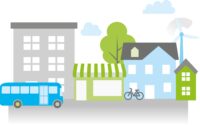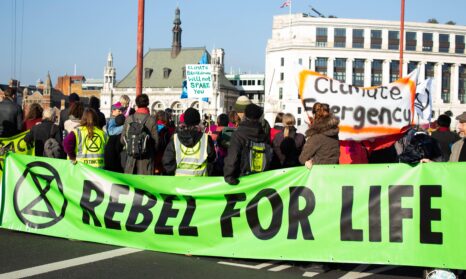What can community groups do to help achieve One Planet Living?
Below you’ll find ideas for actions and initiatives you could run for each of the One Planet Living principles - from health and happiness to zero carbon energy.
These activities are designed to create a joined-up approach to living more sustainably and promoting One Planet Living in your local area, starting with the top four things your group can do to have the biggest impact.
If you want to create a shared vision for One Planet Living across your entire village, town or city that involves other groups, check out our toolkit for communities and neighbourhoods.
Big ideas, big impact
- Use your voices: Write to your local MP or visit them as a group and ask what they’re doing about climate change. You can also tweet businesses that aren’t meeting your expectations.
- Create a culture of buying less, and better: Overconsumption is at the root of many
of our environmental issues. Set up sharing and swapping initiatives for items like tools, books, clothes etc to help local people consume in a more sustainable way. - Promote staying on the ground: One long-haul flight can amount to half a UK person’s yearly carbon footprint. Share tips with your group and local community about opting for local holidays that are accessible by train.
- Follow the plant-based trend: cutting down on meat and dairy slashes environmental impact – from carbon emissions to water consumption and deforestation. Host veggie events and encourage people to enjoy veggie and vegan food with inspiring recipes!
How to spread the word
One of the most important things you can do as a community group is spread the word about sustainability and provide a space for people to share advice and resources.
Consider setting up a Facebook or WhatsApp group to do this – it will make promoting sustainable ideas and organising events much easier.
One Planet Living tips
The tips below use links to UK-specific resources, but the ideas can be used across countries. Feel free to copy and paste the text and add your own links.
Health and happiness: Encouraging active, sociable, meaningful lives to promote good health and wellbeing
- Do good while exercising by finding or setting up a GoodGym or Green Gym
- Promote healthy eating and foster a sense of community with shared meals that bring people together – try sticking to a veggie menu!
- Support local wellbeing – from running, yoga or meditation sessions to organising community walks in local green spaces
- Encourage volunteering as a way to help others and enjoy meaningful interactions with your community
- Host community events – have fun with film and games nights and learn about sustainability with talks and workshops.
Equity and local economy: Creating safe, equitable places to live and work which support local prosperity and international fair trade
- Support a fairer local and global economy by buying from and promoting independent retailers and fairly traded products– you could set up a buying group to bring costs down and minimise waste
- Share information on how to choose banks that invest sustainably and ethically and divest your pension
- Make the most of local expertise by skills sharing – from plumbing to mentoring, there are lots of opportunity to help each other, save money and meet new people
- Engage and listen to a wide range of people in your local area by making your events accessible eg disabled access, culturally appropriate, childcare availability if possible.
Culture and community: Nurturing local identity and heritage, empowering communities and promoting a culture of sustainable living
- Use your collective voices to lobby your MP/council on issues that matter to you
- Inspire your group by hosting guest speakers involved in sustainability eg energy-saving initiatives, food-growing projects, protection of wildlife
- Provide opportunities for people to come together with a community coffee morning – and work with other community groups to engage isolated people
- Create an online forum using social media for people to share tips on being more sustainable, swapping and sharing items and supporting one another
- Learn more about your local area and enjoy what it has to offer in terms of low-cost and low-carbon activities eg parks and museums – and shout about these to other people too.
Land and nature: Protecting and restoring land for the benefit of people and wildlife
- Create a community garden on unused land. Even the smallest gardens can be havens for wildlife if you grow pollinator plants. Check out our top ten tips for helping nature in your community garden
- Promote avoiding fertilisers or pesticides that harm wildlife (and people) – Pesticide Action Network UK has lots of information about the issues and ideas for alternatives
- Join forces with your local green space or park group to do a regular litter pick of green spaces in your area.
Sustainable water: Using water efficiently, protecting local water sources and reducing flooding and drought
- Promote water-saving campaigns and tips like Hubbub’s tap chat
- Install a water butt at your community centre and harvest rainwater for watering plants
- Be water conscious at home – here are some tips for making savings, as well as some handy gadgets
- Find out if you have a local river protection group, join Surfers against sewage or organise a beach clean-up.
Local and sustainable food: Promoting sustainable humane farming and healthy diets in local, seasonal organic food and vegetable protein
- Commit to serving only vegetarian/vegan food at community meetings
- Use community allotments, swap seeds, and join the Incredible Edible network
- Host or support local foraging courses
- Make the most of British produce by supporting your local farmers’ market, or try to set one up
- Share surplus food communally with a community fridge and look at great advice from Love Food, Hate Waste.
Travel and transport: Reducing the need to travel, and encouraging walking, cycling and low carbon transport
- Promote and get involved with car-sharing using LiftShare or BlaBlaCar – it’s a great way to cut the carbon footprint of your commute or other trips
- Campaign for better cycling infrastructure in your local area. Consider hosting a cycling safety talk for anyone worried about cycling on the roads.
- Invest in a community pool electric bike
- Commit to cutting down on flying – share tips and ideas for holidays by train.
Materials and products: Using materials from sustainable sources and promoting products which help people reduce consumption
- Help yourselves and local people to buy less stuff – turn to charity shops for clothes, share items like tools with your neighbours and swap books and films with your friends and family. You could set up a ‘Library of things’
- Run ‘Bring and Take’ events where you bring anything you don’t want anymore and take anything away for free
- Ask for local businesses or the community centre to stock SESI refills for dried food goods or for household products like detergent
- Promote buying better when you need to – opt for products that are sustainable, high-quality and that can be repaired.
Zero waste: Reducing consumption, reusing and recycling to achieve zero waste and zero pollution
- Educate people about why reducing and reusing are better than recycling. Check out our zero-waste survival kit and these 101 zero-waste tips
- Repair things that break by putting on repair workshops/cafes to limit the amount you throw away - developing DIY skills and meeting new people
- Share how to recycle as much as you can – from food waste and packaging and old clothes and shoes to batteries.
- Encourage local businesses to sign up to the Refill scheme.
Zero carbon energy: Making buildings and manufacturing energy-efficient and supplying all energy with renewables
- Encourage your community centre to swap to a green energy supplier if available, buy energy-efficient appliances and be energy-savvy – it’s not just about turning lights off!
- Run an evening discussion about home energy efficiency and renewables, getting an expert speaker in, and sharing tips and advice
- Investigate community-led renewable energy opportunities and the support available.
Share your own tips with us on social media using #OnePlanetLiving. You can also download these ideas in PDF format below.
Use the Global Footprint Network's calculator to understand your personal ecological footprint.








